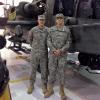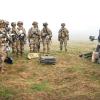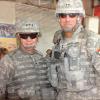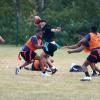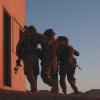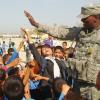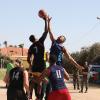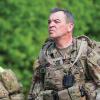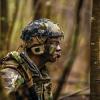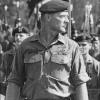Leadership encompasses several skill sets, and not all of them are easily taught or learned. Leadership is both a skill and a practice. Leadership is more difficult and advanced than management or supervision, and it relies on the ability to influence and motivate others to achieve a common goal. It is a complex process requiring a variety of skills and qualities, including communication, delegation, decision-making and problem-solving, as well as humility. All professions and employees value leadership, which is in short supply in...
Center for Leadership Essays
The “On Leadership” section at the front of Army Magazine is designed to stimulate thought and discussion on how to build and lead effective, cohesive, and honorable teams across the Total Army.
These essays were previously published in ARMY magazine.
The purpose of briefing is to convey information in a manner the audience can best receive the information. This could be for support, funding, information, a decision or general knowledge. Regardless, your responsibility is to present the information in a way that sticks in the boss’ mind. The briefing is not about what you know, how the slides look or about what you say. It is always about how your boss receives the information. Following are some tips to help you prepare better briefings to help your boss. These tips go beyond the...
The simple request came in an email, asking me to provide some thoughts about the importance of mentorship. A story about someone who helped me become a better leader. Thinking back over two careers—my long time in the Army and a shorter time in the health care industry—hundreds of faces appeared in my memory’s eye. General officers like Fred Franks, Eric Shinseki, Larry Jordan and Herbert Lloyd delivered phenomenal guidance and helped me grow, as did command sergeants major like Roger Blackwood, Thomas Capel and David Davenport...
What follows is a tale, a true one, not a tall one. It is the legacy message of a unit in which leadership, teamwork and esprit de corps flourished. Beyond that, it also is the story of a game and the special role it played in helping prepare the officers, NCOs and soldiers of that unit to fight and win on other fields on other days. I arrived at my new unit, the 1st Battalion, 16th Infantry Regiment, in January 1984 and was there only 24 hours when I first heard of the game that dominated the unit’s casual conversation throughout the...
What makes a good leader? Countless articles, books, videos, blogs and doctrinal publications attempt to answer this question, and they are all probably correct to some degree. However, upon reflection, it occurred to us that as young soldiers, we often developed strong feelings about our leaders and their ability to lead. These feelings were not based on some formal application of leadership style or doctrine, but rather, on the quality of time they spent with us. In early assessments of our leaders, squad leaders were the most...
On Jan. 1, after 32 years of service, I officially left the active-duty ranks of the U.S. Army. Like most others who serve for an extended period, I dove into deep reflection on my time spent in the military and the “so what” of it all. Was it worth it? Did I make an impact? Was I a good leader? And did I make a difference? I would like to think the answer to these questions is a resounding yes. I asked myself two last questions: Would I do it again, and would I change anything? No matter how much time I spent reflecting and how many...
The Duke of Wellington is quoted as saying: “The Battle of Waterloo was won on the playing fields of Eton.” As he reflected on the rich, athletic tradition of Eton College in England, Wellington drew a comparison between the qualities of the successful athlete and team, and those of the victorious soldier and army. What were those qualities? Leadership? Teamwork? Esprit de corps? No doubt these and more. From experience, Wellington understood that hard work and teamwork create winners, and that the fundamentals of readiness and...
I dealt with barracks management for 30 of my 32 years of service. I lived in the barracks as a young soldier and NCO. I managed three barracks rooms as a team leader and 6,000 barracks rooms as a division command sergeant major. But on a self-evaluation, I would give myself a C-minus on barracks management for most of my career. I am ashamed of this. I did not become fully invested in ensuring that barracks provide the home that soldiers deserve until I became a division command sergeant major. This is a difficult admission. My...
Thucydides is often credited with stating, “The nation that will insist on drawing a broad line of demarcation between the fighting man and the thinking man is liable to find its fighting done by fools and its thinking by cowards.” However, the quote is most likely and accurately attributable to British author Lt. Gen. Sir William Francis Butler in his 1901 biography of Maj. Gen. Charles George Gordon, a controversial British war hero. Regardless, the message is clear—nations must expect and demand that military leaders are both...
As a young captain in 1990, I was excited to be asked to give a presentation at the annual Association of the U.S. Army Annual Meeting and Exposition in Washington, D.C. I had written a number of articles on maneuver warfare and looked forward to the event, which promised to include a large audience. Facing a crowded room, I noticed an elderly gentleman in the front row who seemed to grow more agitated as I spoke. Wrapping up the presentation, I invited questions from the floor. Rising to his feet, the old fellow intoned, “I don’t...
Pagination
- Previous page
- Page 2
- Next page


